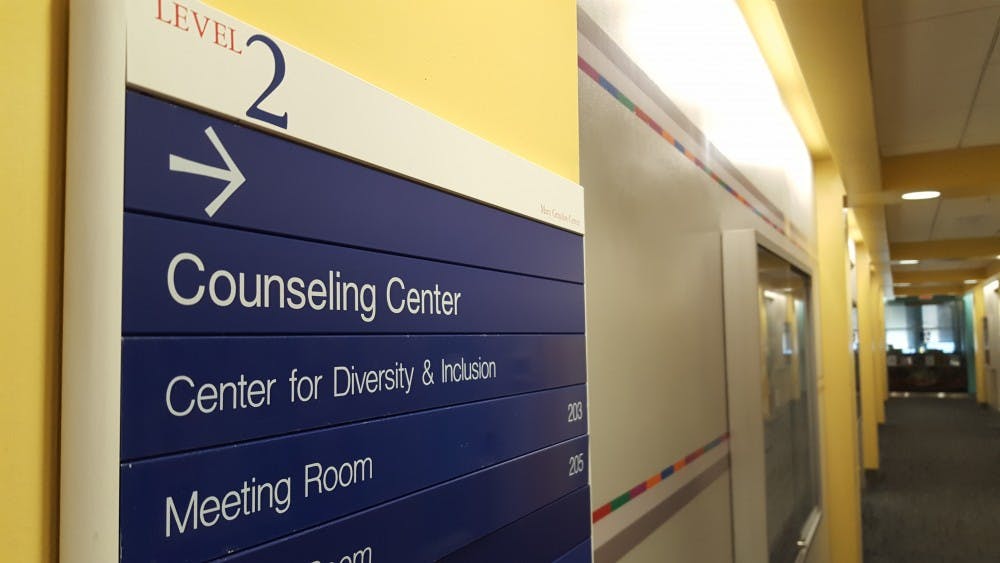Editor’s Note: This article contains references to sexual assault.
The American University Undergraduate Senate passed a resolution on Feb. 26 to urge the University to end the six to eight counseling session limit at the Center for Well-Being Programs and Psychological Services and, in the meantime, implement an appeals process for students to request additional sessions.
Currently, the Center for Well-Being Programs and Psychological Services, which was launched in fall 2022 to replace the former counseling center, offers AU students a maximum of eight free individual virtual sessions per academic year, plus an initial consultation. There are also single session and unlimited group session options offerings. If students want more care, they have to find it elsewhere off campus, which the Center can provide referrals for.
Resolution 18-010 was passed on Feb. 26 at the fifth meeting of the Undergraduate Senate. Resolutions can only express the Senate’s “official sentiment or statement,” according to the SG bylaws, and cannot amend University policies — they can only “implore” administrators to implement a resolution as official policy.
Salvatore Cottone, a senator at-large and sophomore in the School of Public Affairs, wrote and sponsored the resolution with Julia Comino, a senator for the class of 2024 and a junior in SPA and the School of Communication. It passed unanimously and was sent to multiple parties: the Well-Being Center, the Office of the President, the assistant vice president of Campus Life and the Office of the Provost. Members of the Undergraduate Senate have been in discussion with the administration since the resolution was passed.
The issue originally came up for SG at the Community Working Group on Preventing and Responding to Sexual Harassment and Violence that was formed following a sexual assault in Leonard Hall in October 2022. Cottone brought up the counseling session limit at a roundtable discussion for the Community Working Group on Feb. 22 as students protested administrative inaction outside the School of International Service building, where the meeting was being held.
He talked about how the policy is unfair to low-income students that can’t afford off-campus therapy, as well as to students who need more immediate care but instead are placed on long wait lists. Cottone said he has been on one for four months.
“It’s an issue and a policy that’s not equitable at all,” he told The Eagle.
The resolution states that “the Undergraduate Senate calls on the Center for Well-Being and the American University Administration to end the 6-8 session cap on counseling sessions per year… In the meantime they must implement an appeals process for students to request additional counseling sessions until they get off a waitlist for a therapist.”
The appeals process would be for anyone that needs additional care, but especially for students in extreme circumstances, such as losing a loved one, being on a long outside waiting list, being a survivor or low income, according to Cottone.
Cottone said this process should be created using student input, as well as a committee, to ensure it goes smoothly through administration and is properly implemented.
“We need more sessions … because we can’t leave students in the dark, cutting them from this vital care,” said Cottone.
The resolution also asks for a “comprehensive resource guide” of mental health services on and off campus, resources for survivors of sexual assault and identity and affinity based resources.
Aly McCormick, the speaker of the Undergraduate Senate and a sophomore in SPA, said she wants to see more publicization of why the six to eight session limit exists, as well as the resources available so students are more aware of their options.
According to McCormick, the University does have a process put in place where students can receive additional sessions under special circumstances, but it is not highly publicized. She said an example of this might be if a student has a parent who is ill, and is on the seventh or eighth session when they pass away, their counseling could be extended because of that extenuating circumstance. However, that is determined by the clinician rather than the student.
“The determination to provide 8 sessions, in addition to a consultation session, is driven by data and analysis from the Center for Collegiate Mental Health,” wrote Jasmine Pelaez, AU’s internal communications manager, in an email to The Eagle. “Their report on college students receiving mental health services from 147 college and university counseling centers, including AU, included data on client improvement and session length. This data illustrates that students who attended nine therapy sessions improved significantly since their first session. Additional sessions, beyond nine, showed minor changes in distress.”
AU had unlimited counseling sessions back when the student population was lower, according to Cottone. Currently, there are nine licensed staff counselors, one of whom serves the Washington College of Law, and four unlicensed doctoral interns staffed at the Well-Being Center. Eventually, SG members want to see AU hire more staff and invest in more office space.
Other recent SG resolutions passed include urging the University to adopt a survivor’s bill of rights, urging solidarity and support with AU’s dining service workers, who are a part of the union Local 23 and a call for AU to add OneCards to mobile wallet services for effective residence hall access.
Cottone said there will be continued conversations between students and the University regarding this resolution.
“We need more student awareness and more students involved in these conversations,” Cottone said. “If it’s just me or if it’s just the speaker, that’s one thing but if it’s just a bunch of students coming together and coming up with solutions for this and pushing the University to demand more hiring practices for new staff and new office space, then eventually we can see a university with unlimited counseling sessions for students, which will ultimately increase the well-being of the whole campus.”
This article was edited by Mackenzie Konjoyan, Jordan Young and Nina Heller. Copy editing done by Isabelle Kravis, Sarah Clayton and Stella Guzik.





